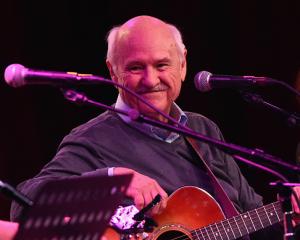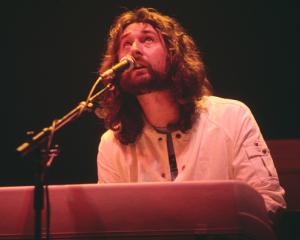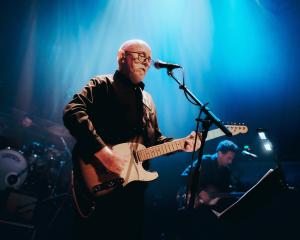
There is a saying that it takes three generations to make an artist - the first pulls itself out of poverty, the second educates itself and then the third can be an artist.
Thanks to her mother, a Korean former refugee, Jennifer Koh has shown one can become an artist in one generation.
Koh's multi-disciplinary work Everything That Rises Must Converge recognises her mother's determination and achievements. She is creating it in collaboration with composer/multi-media artist Jean-Baptiste Barriere and director/dramaturge Aleksi Barriere.
Koh has been looking deeper into her mother's experiences growing up in North Korea and coming to the United States in 1965 as a refugee during the Korean War.
''Her family lost everything.''

''In one generation she pulled herself out of poverty and educated herself so I could become an artist.''
As former refugees, Koh's parents wanted her to have all the opportunities they had not been afforded, so they started her early in all sorts of activities such as ballet, gymnastics, ice skating, swimming and music.
''Music was the strongest. In the most visceral way, it was just a kind of incredible intense emotional connection and form of communication.''
She was 3 years old when she started to learn the violin and was fortunate to have an ''incredible teacher'' in the Suzuki Method.
''She told my mum I had talent and taught me everything she could until it was time for me to move teachers . . . she chose the teacher I should go to and came to lessons with me and practised with me every day.''
Appropriately, the Suzuki Method takes the processes of parental love, nurture and encouragement which underpin language acquisition as its basis for teaching music.
Koh made her debut with the Chicago Symphony Orchestra at age 11.
Despite this prodigious beginning, she kept her options open, electing to study literature at university before enrolling in the Curtis Institute of Music.
''I'm very grateful to my mentors and teachers. They believed in me before I believed in myself. I didn't know I could be a musician. I knew I wanted music in my life but I didn't really know if I could do it.''
She was the prize winner at Moscow's International Tchaikovsky Competition for classical music performance in her first year of university but decided to continue with her literature degree. She wanted time and space to learn and to grow up before embarking on a career in music.
''I don't come from a family of musicians so the idea was incredibly foreign to me.
''I do recall at some point she told me no-one needs music in war, they need doctors - you should become a doctor.''
One of the greatest things she learned at university is not being afraid to fail.
''One must take risks in life and I see music as a very visceral form of human communication.''
The project based on her mother's experiences was initially called ''The 38th Parallel'' to acknowledge the barrier imposed in 1945 as an arbitrary divide between the Korean land occupied by the Soviet Union and the US (which became North and South Korea, respectively).
''The reason for the title change is we wanted to celebrate her.''
For the project, Koh sat down with her mother and interviewed her over the course of a week, for five hours each day.
''You speak to your parents, have conversations, but this, I'd never done that with my mum before. I knew little bits of her history.''

Koh (43) acknowledges that probing into her mother's past painful experiences has not always been an easy task - for either woman. Her mother was only 5 years old when she saw people shot and executed in front of her and people running for their lives as they tried get food and water.
''You can't comfort them as it happened in the past.
''The dramaturge, he's Korean-American, was shocked she was so open. He said my mum's generation who went through the war actually do not want to talk about it as it's traumatising.''
Koh's mother told her how all of her classmates lost their parents or lost siblings as a huge percentage of the population of Korea were killed in the war.
''Every family was affected. That trauma can live for generations. The fact she was so open, I truly appreciated.''
She found listening to the experiences hard in the sense she could not protect her from them.
''It was painful to hear from somebody you love. But I know my mum better in a way.''
But while the conversation was hard, Koh says it was also very important given what is happening to immigrants and refugees in the United States, which is very dehumanising.
'' I wanted to humanise and bring to life the story of a refugee, my mum, and how she rose as a refugee and as an immigrant in order for me to be on the stage where I'll perform this work.
''In a way it is a reflection upon my family but in another way it is knowing my mum better.''
Koh believes the arts are about empathy and creating understanding.
''It has been a way to understand her more. It has been a path toward that.
''I really wanted the work to communicate on when dealing with refugees they are survivors and very determined and driven and to celebrate what they have to offer as human beings and what can happen in one generation.''

When talking to her mother, Koh learned she had become involved in information sciences as a direct reaction to her past.
''Growing up there was such a limited access to to information and a great deal of propaganda so she wanted to be in a field where she could offer information freely.''
As a professor for more than 40 years she will have taught thousands of students how to access information. It was a vocation which allowed her to actively contribute to democracy, from a standpoint of understanding what a lack of freedom of information means for society.
''Immigrants offer a lot.''
Projects like this drive Koh, who believes in music as another important medium for communicating kindness and empathy.
''It's more of a philosophy of living. How one goes about that evolves every day.
''What became clearer and clearer to me is community service. For me, when I wake up every morning I want to be a better musician, to be a better artist and I think a lot about how I can serve my community at large, how I can serve my community of artists and my art form.''
As part of her mission to serve the artistic communities she is involved in, Koh commissions a lot of work. In particular, she advocates for and supports the work of female composers and composers of colour.
The latest project she has been involved in seeks to reflect what America is - including women and people of colour might, hopefully, broaden ideas of who gets to be counted within ideas of ''America''.
''For me its about expanding the art form, it's about serving the art form. Even if you look back historically in Bach's time the church was the main sponsor for music but he brought in popular dance forms and then Mozart for example the main sponsors were the court system and he brought it different fads.''
She believes the way music progresses is by adding voices to the art form.
''I know what is going on in my own brain so what's more interesting to me is hearing other people's experiences and perspectives''.
Koh she sees her ''life mission'' as being to support and advocate for other musicians.
''It would be a tragedy if we did not hear other people's stories or other people's voices. It would be a tragedy for us as a community.''
She is also a keen collaborator and willing to try new things.
She became the first Asian female to play Einstein in the revival of Philip Glass and Robert Wilson's Einstein on the Beach from 2012 to 2014.
''The make-up alone took one and a-half hours to turn a Asian female into a fat, old Jewish man.''
The experience was ''very artistically intense'' as at five hours it was a long opera and very demanding, she says.
''I really bonded with Philip Glass and Robert Wilson.''
When a tribute to Glass was being organised at the 2018 Kennedy Center Honours, Koh was invited to perform a selection of work from Einstein, before playing a piece of Glass' music with indie-rock musician St Vincent (Annie Clark).
''I do not believe in genre. For me really and truly the world is divided into good artists and bad artists, good musicians and bad musicians. Engaging with great artists, it's the same language, its the same kind of dedication, its the same kind of creativity, creative process.''
She loves the collaborative process as she finds it gives her an interesting perspective on the world.
''I work with all the people I think are great. Some happen to be known as a jazz person or as a director you know but they're just great artists. You learn a great deal from each other.''
Being part of the music community is special to her.
''I also have great girlfriends. Those relationships are the highlight of my life. Of course I've had great experiences in performing or bringing a work to life but to me honestly, the process is the most interesting part, the people I work with.''
Koh is excited about coming to New Zealand for the first time to play with the New Zealand Symphony conducted by music director Edo de Waart.
She will perform the renowned contemporary work Violin Concerto, written by Finnish composer and conductor Esa-Pekka Salonen. The concerto, which weaves together myriad references from Bach to rock, premiered 10 years ago and even featured in an Apple iPad commercial.
''I love this concerto, it's so very moving . . . it's so incredibly well crafted.''
Koh goes on to muse about how performer-composers seem to write music with a perfect sense of timing.
''I get very nerdy with analysis. All you need to know is it's fun.''
To see
‘‘The Great’’, NZSO
Dunedin Town Hall
November 15, 7.30pm












